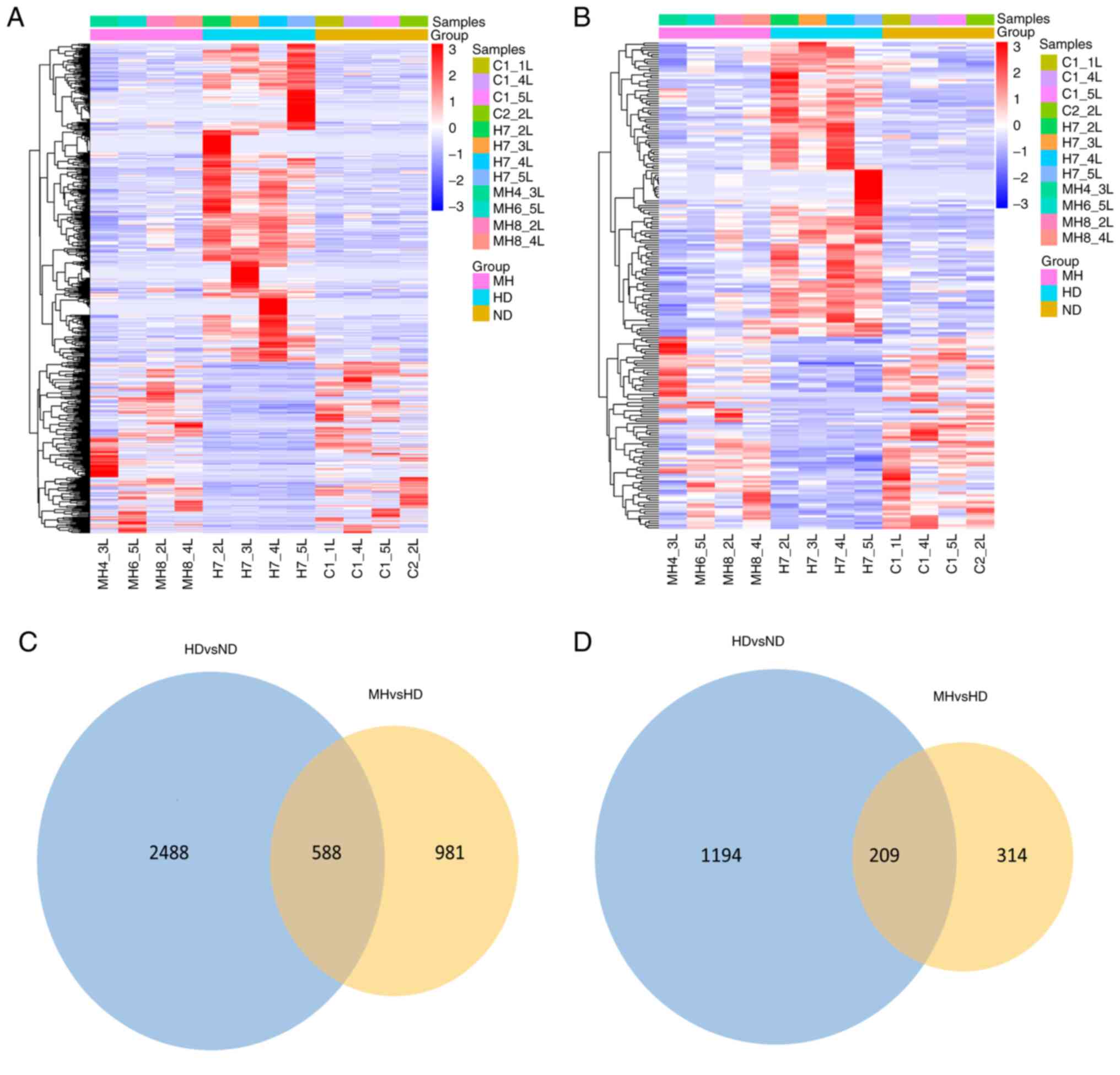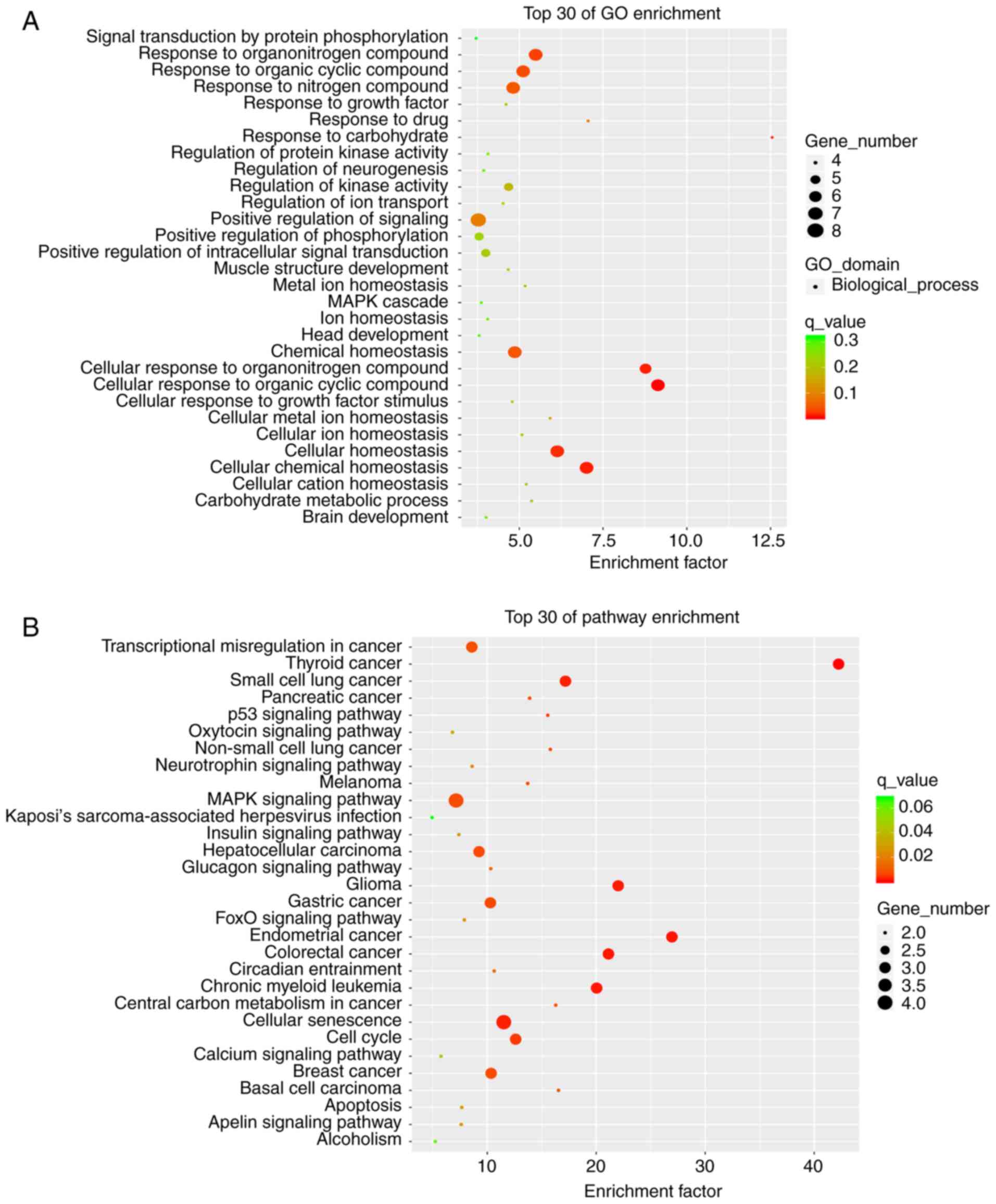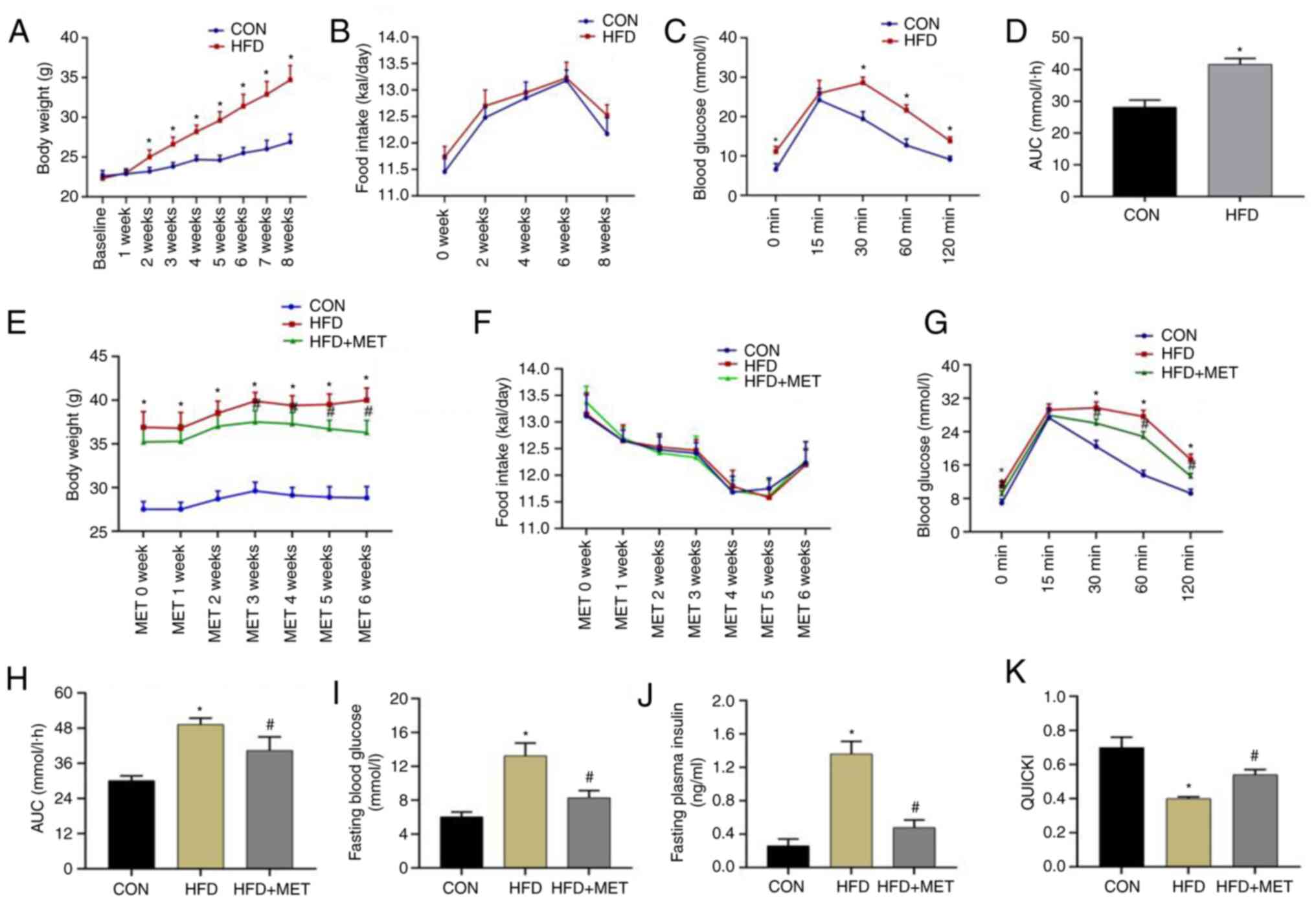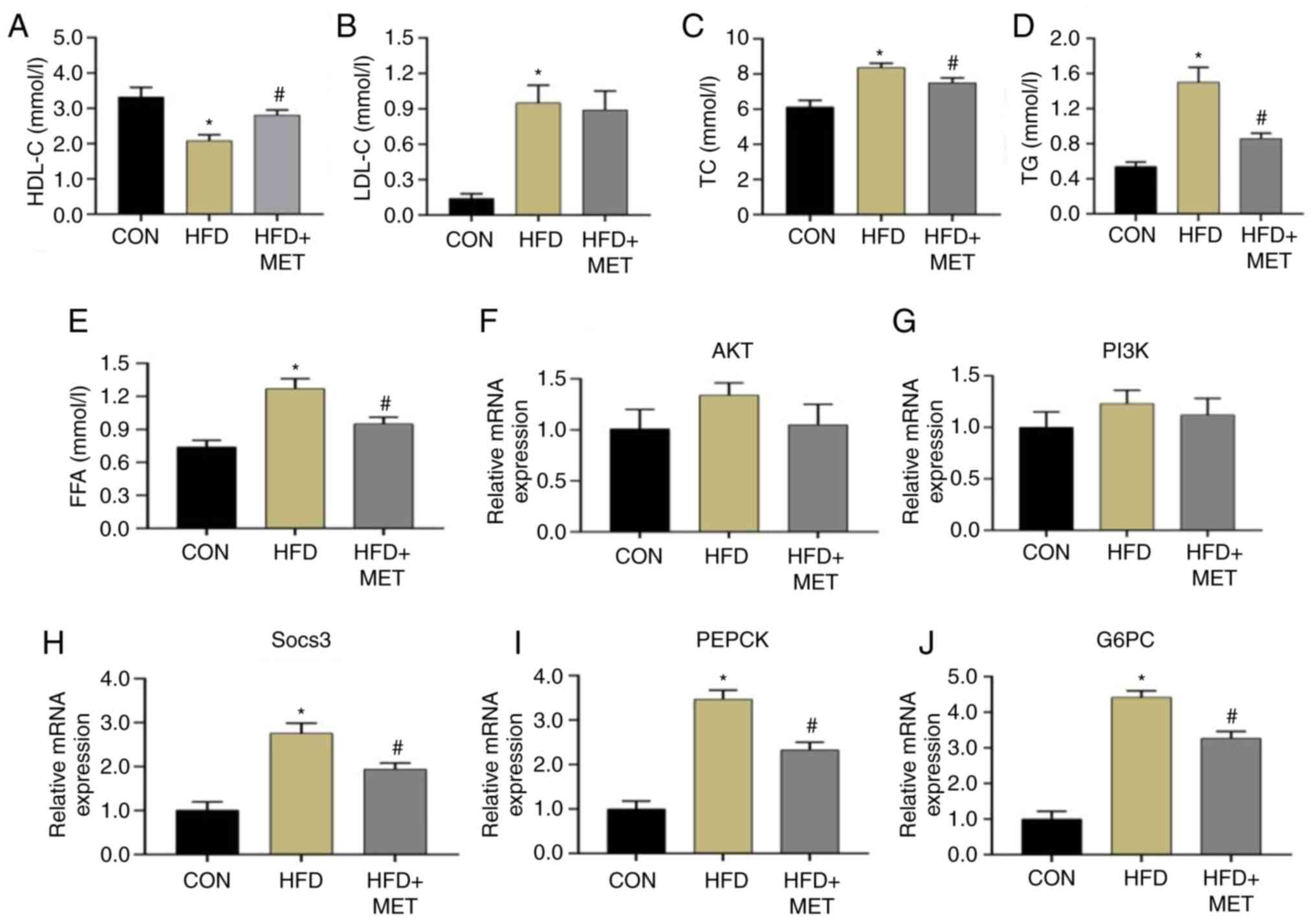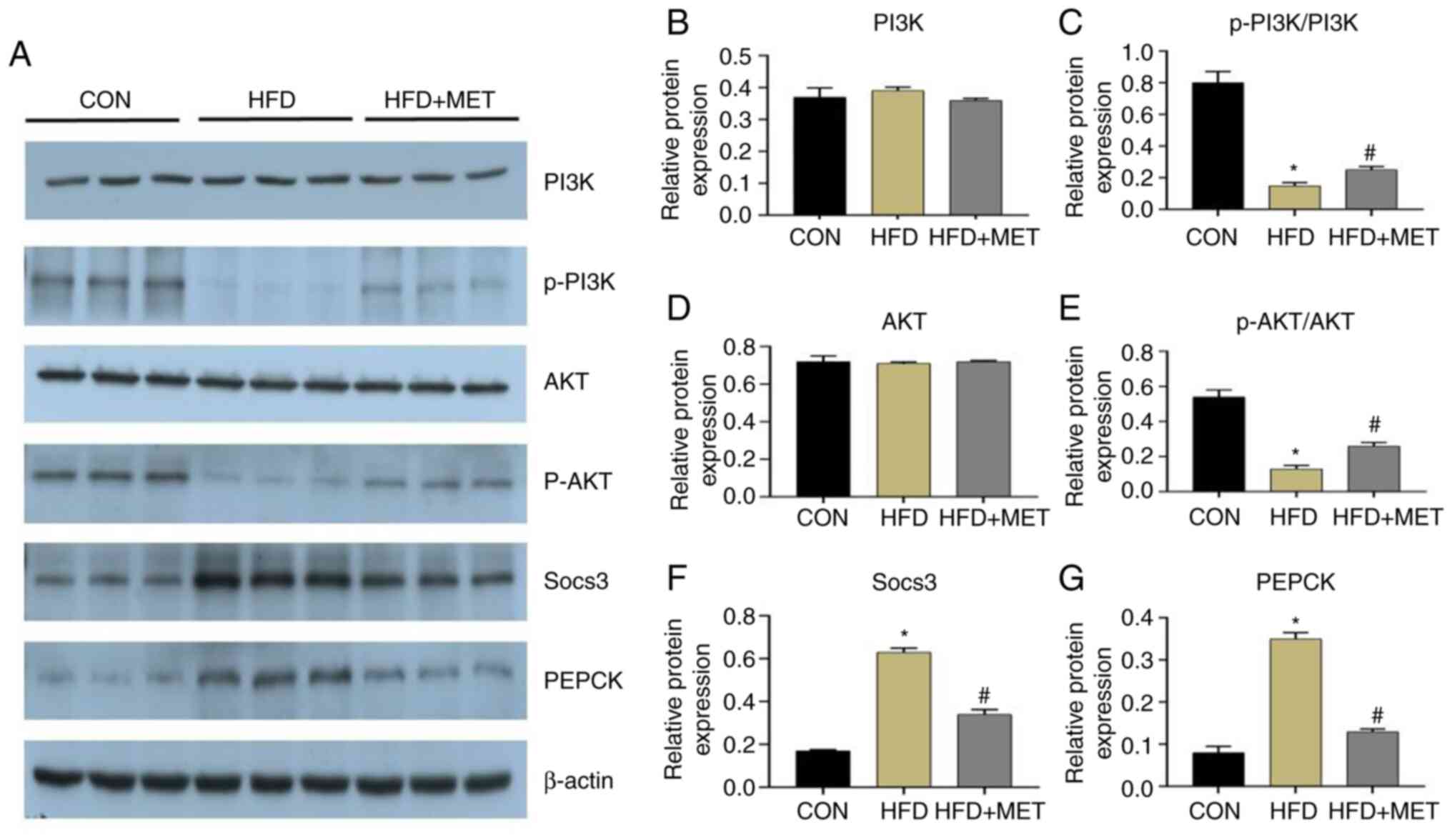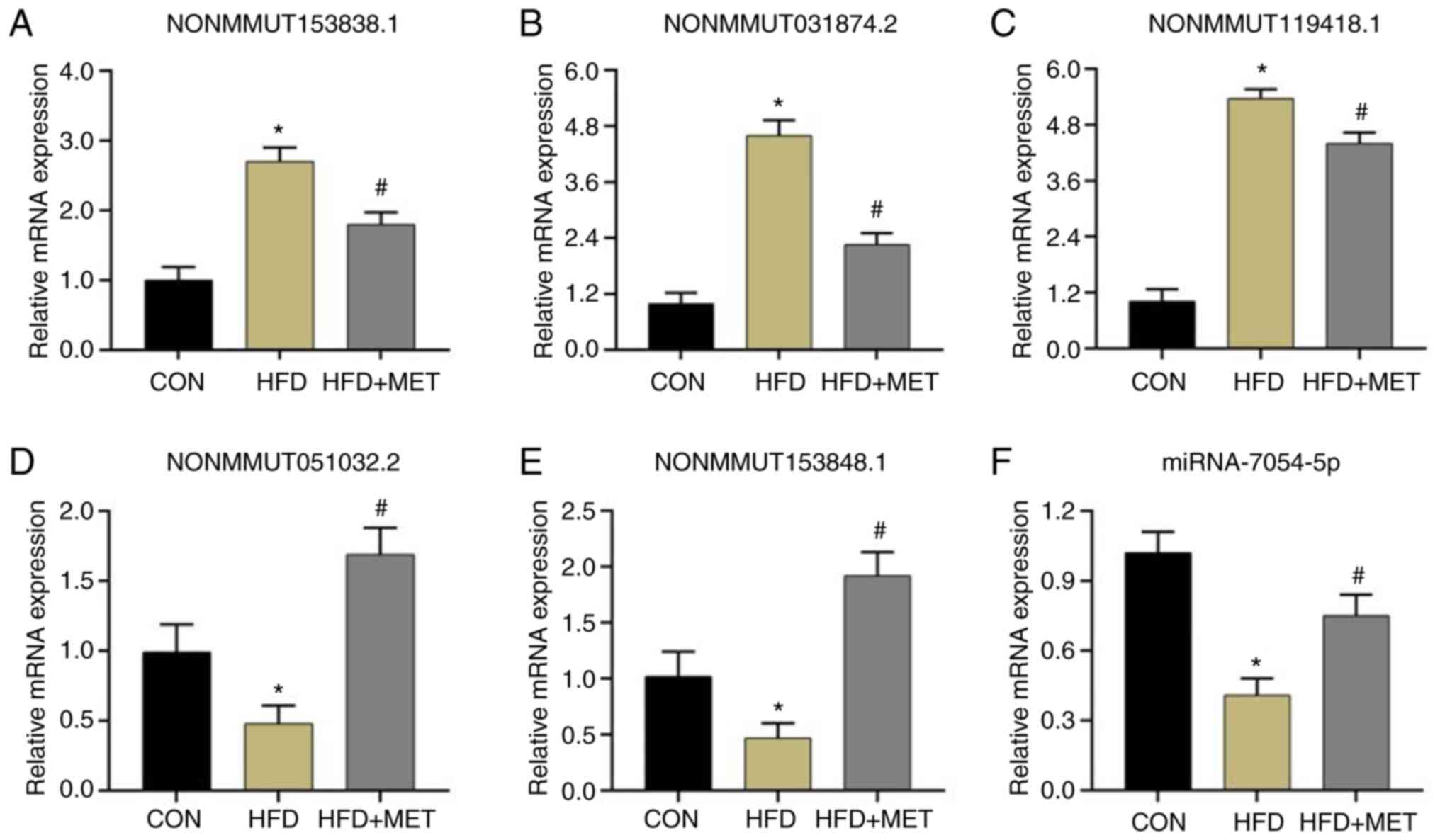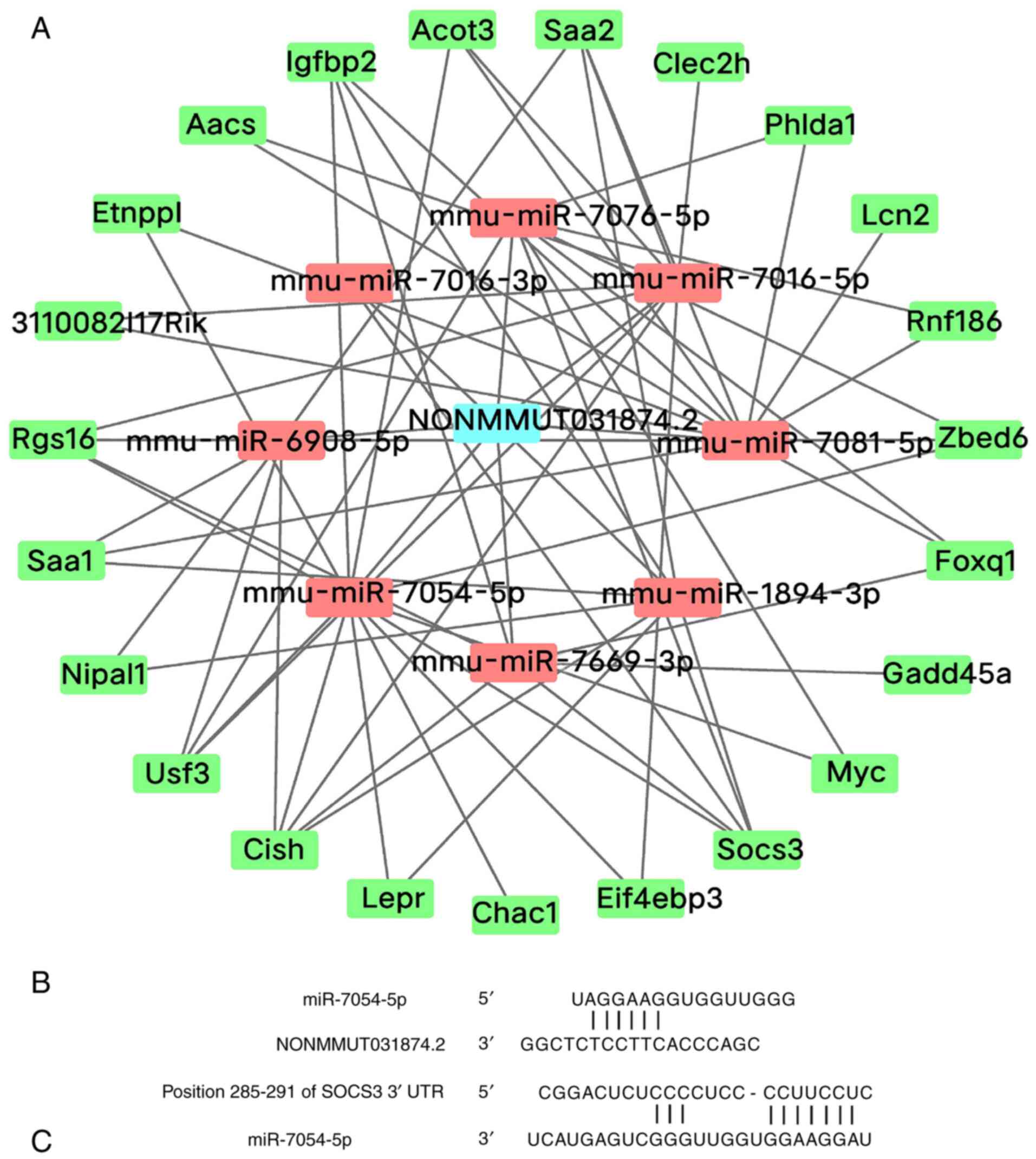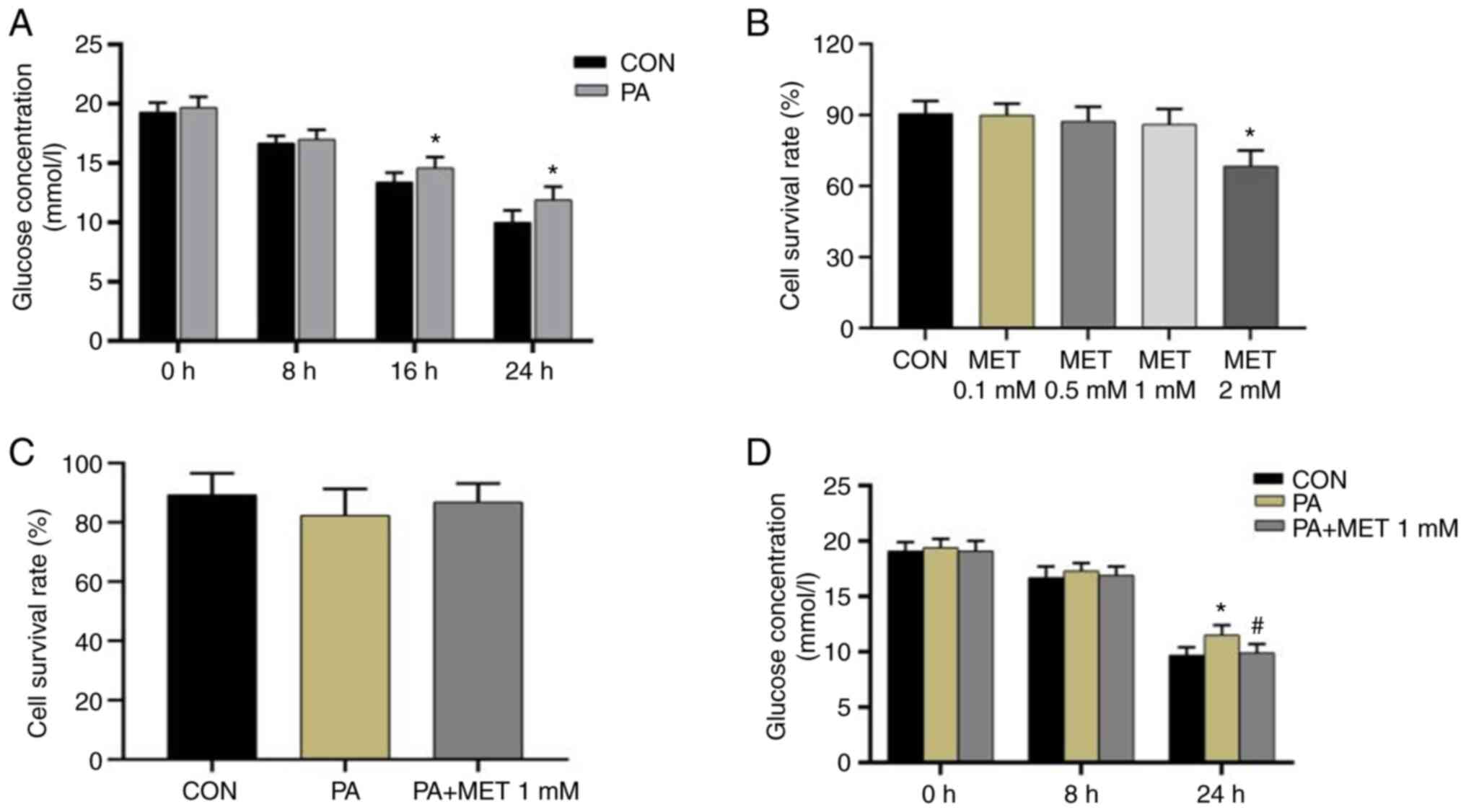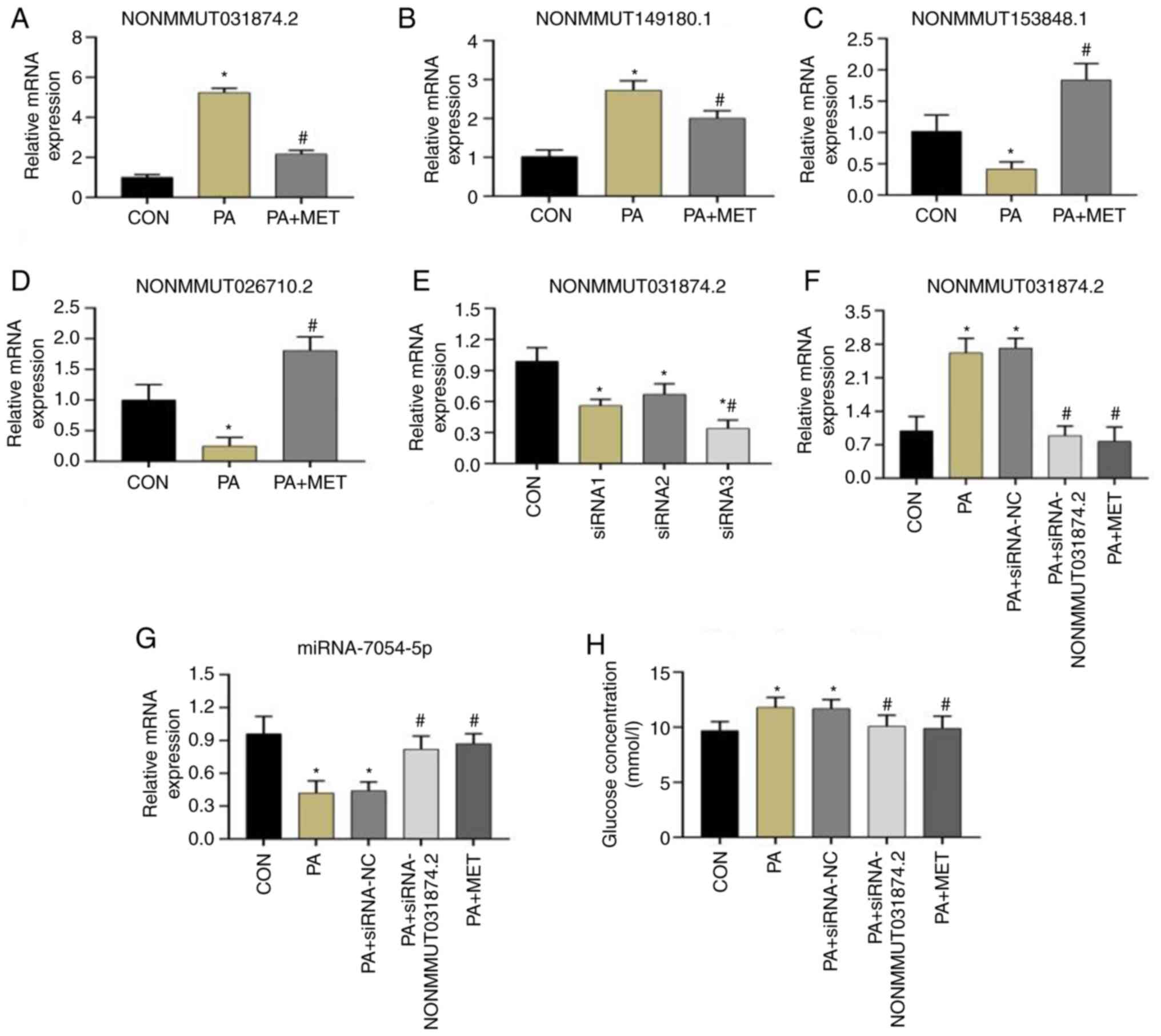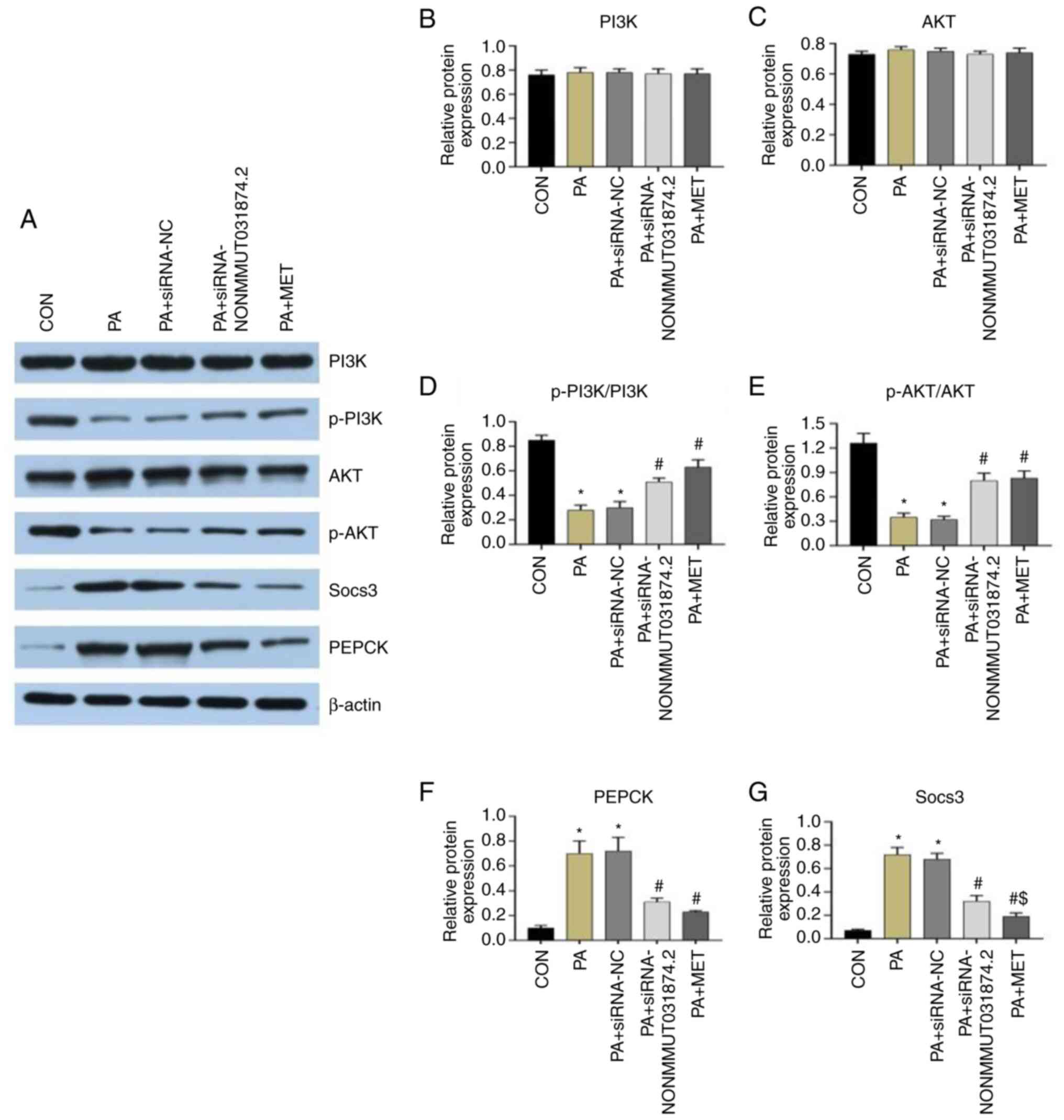|
1
|
Ning G: Decade in review-type 2 diabetes
mellitus: At the centre of things. Nat Rev Endocrinol. 11:636–638.
2015.PubMed/NCBI View Article : Google Scholar
|
|
2
|
Ogurtsova K, da Rocha Fernandes JD, Huang
Y, Linnenkamp U, Guariguata L, Cho NH, Cavan D, Shaw JE and
Makaroff LE: IDF diabetes atlas: Global estimates for the
prevalence of diabetes for 2015 and 2040. Diabetes Res Clin Pract.
128:40–50. 2017.PubMed/NCBI View Article : Google Scholar
|
|
3
|
Akash MSH, Rehman K and Liaqat A: Tumor
necrosis factor-alpha: Role in development of insulin resistance
and pathogenesis of type 2 diabetes mellitus. J Cell Biochem.
119:105–110. 2018.PubMed/NCBI View Article : Google Scholar
|
|
4
|
Kurokawa R, Rosenfeld MG and Glass CK:
Transcriptional regulation through noncoding RNAs and epigenetic
modifications. RNA Biol. 6:233–236. 2009.PubMed/NCBI View Article : Google Scholar
|
|
5
|
Ravasi T, Suzuki H, Pang KC, Katayama S,
Furuno M, Okunishi R, Fukuda S, Ru K, Frith MC, Gongora MM, et al:
Experimental validation of the regulated expression of large
numbers of non-coding RNAs from the mouse genome. Genome Res.
16:11–19. 2006.PubMed/NCBI View Article : Google Scholar
|
|
6
|
Sathishkumar C, Prabu P, Mohan V and
Balasubramanyam M: Linking a role of lncRNAs (long non-coding RNAs)
with insulin resistance, accelerated senescence, and inflammation
in patients with type 2 diabetes. Hum Genomics.
12(41)2018.PubMed/NCBI View Article : Google Scholar
|
|
7
|
Hanson A, Wilhelmsen D and DiStefano JK:
The role of long non-coding RNAs (lncRNAs) in the development and
progression of fibrosis associated with nonalcoholic fatty liver
disease (NAFLD). Noncoding RNA. 4(18)2018.PubMed/NCBI View Article : Google Scholar
|
|
8
|
Pielok A and Marycz K: Non-coding RNAs as
potential novel biomarkers for early diagnosis of hepatic insulin
resistance. Int J Mol Sci. 21(4182)2020.PubMed/NCBI View Article : Google Scholar
|
|
9
|
Davies MJ, D'Alessio DA, Fradkin J, Kernan
WN, Mathieu C, Mingrone G, Rossing P, Tsapas A, Wexler DJ and Buse
JB: Management of hyperglycaemia in type 2 diabetes, 2018. A
consensus report by the American diabetes association (ADA) and the
European association for the study of diabetes (EASD).
Diabetologia. 61:2461–2498. 2018.PubMed/NCBI View Article : Google Scholar
|
|
10
|
Hundal RS, Krssak M, Dufour S, Laurent D,
Lebon V, Chandramouli V, Inzucchi SE, Schumann WC, Petersen KF,
Landau BR and Shulman GI: Mechanism by which metformin reduces
glucose production in type 2 diabetes. Diabetes. 49:2063–2069.
2000.PubMed/NCBI View Article : Google Scholar
|
|
11
|
Ren GF, Xiao LL, Ma XJ, Yan YS and Jiao
PF: Metformin decreases insulin resistance in type 1 diabetes
through regulating p53 and RAP2A in vitro and in vivo. Drug Des
Devel Ther. 14:2381–2392. 2020.PubMed/NCBI View Article : Google Scholar
|
|
12
|
Grycel S, Markowski AR, Hady HR, Zabielski
P, Kojtallmierska M, Górski J and Blachnio-Zabielska AU: Metformin
treatment affects adipocytokine secretion and lipid composition in
adipose tissues of diet-induced insulin-resistant rats. Nutrition.
63-64:126–133. 2019.PubMed/NCBI View Article : Google Scholar
|
|
13
|
Wang Y, Tang H, Ji X, Zhang Y, Xu W, Yang
X, Deng R, Liu Y, Li F, Wang X and Zhou L: Expression profile
analysis of long non-coding RNAs involved in the
metformin-inhibited gluconeogenesis of primary mouse hepatocytes.
Int J Mol Med. 41:302–310. 2018.PubMed/NCBI View Article : Google Scholar
|
|
14
|
Ferdowsian H: Human and animal research
guidelines: Aligning ethical constructs with new scientific
developments. Bioethics. 25:472–478. 2011.PubMed/NCBI View Article : Google Scholar
|
|
15
|
Zhao H, Zhang Y, Shu L, Song G and Ma H:
Resveratrol reduces liver endoplasmic reticulum stress and improves
insulin sensitivity in vivo and in vitro. Drug Des Devel Ther.
13:1473–1485. 2019.PubMed/NCBI View Article : Google Scholar
|
|
16
|
Katz A, Nambi SS, Mather K, Baron AD,
Follmann DA, Sullivan G and Quon MJ: Quantitative insulin
sensitivity check index: A simple, accurate method for assessing
insulin sensitivity in humans. J Clin Endocrinol Metab.
85:2402–2410. 2000.PubMed/NCBI View Article : Google Scholar
|
|
17
|
Fang F, Li H, Qin T, Li M and Ma S: Thymol
improves high-fat diet-induced cognitive deficits in mice via
ameliorating brain insulin resistance and upregulating NRF2/HO-1
pathway. Metab Brain Dis. 32:385–393. 2017.PubMed/NCBI View Article : Google Scholar
|
|
18
|
Zhang R, Chu K, Zhao N, Wu J, Ma L, Zhu C,
Chen X, Wei G and Liao M: Corilagin alleviates nonalcoholic fatty
liver disease in high-fat diet-induced C57BL/6 mice by ameliorating
oxidative stress and restoring autophagic flux. Front Pharmacol.
10(1693)2020.PubMed/NCBI View Article : Google Scholar
|
|
19
|
Villalva-Pérez JM, Ramírez-Vargas MA,
Serafín-Fabían JI, Ramírez M, Moreno-Godínez ME, Espinoza-Rojo M
and Flores-Alfaro E: Characterization of Huh7 cells after the
induction of insulin resistance and post-treatment with metformin.
Cytotechnology. 72:499–511. 2020.PubMed/NCBI View Article : Google Scholar
|
|
20
|
Livak KJ and Schmittgen TD: Analysis of
relative gene expression data using real-time quantitative PCR and
the 2(-delta C(T)) method. Methods. 25:402–408. 2001.PubMed/NCBI View Article : Google Scholar
|
|
21
|
Robinson MD, McCarthy DJ and Smyth GK:
edgeR: A bioconductor package for differential expression analysis
of digital gene expression data. Bioinformatics. 26:139–140.
2010.PubMed/NCBI View Article : Google Scholar
|
|
22
|
Moriya Y, Itoh M, Okuda S, Yoshizawa A and
Kanehisa M: KAAS: An automatic genome annotation and pathway
reconstruction server. Nucleic Acids Res. 35 (Web Server
Issue):W182–W185. 2007.PubMed/NCBI View Article : Google Scholar
|
|
23
|
Rice P, Longden I and Bleasby A: EMBOSS:
The European molecular biology open software suite. Trends Genet.
16:276–277. 2000.PubMed/NCBI View Article : Google Scholar
|
|
24
|
Li YC, Kang L, Huang J, Zhang J, Liu C and
Shen W: Effects of miR-152-mediated targeting of SOCS3 on hepatic
insulin resistance in gestational diabetes mellitus mice. Am J Med
Sci. 361:365–374. 2021.PubMed/NCBI View Article : Google Scholar
|
|
25
|
Guariguata L, Whiting DR, Hambleton I,
Beagley J, Linnenkamp U and Shaw JE: Global estimates of diabetes
prevalence for 2013 and projections for 2035. Diabetes Res Clin
Pract. 103:137–149. 2014.PubMed/NCBI View Article : Google Scholar
|
|
26
|
Kim J, Bilder D and Neufeld TP: Mechanical
stress regulates insulin sensitivity through integrin-dependent
control of insulin receptor localization. Genes Dev. 32:156–164.
2018.PubMed/NCBI View Article : Google Scholar
|
|
27
|
Yan C, Chen J and Chen N: Long noncoding
RNA MALAT1 promotes hepatic steatosis and insulin resistance by
increasing nuclear SREBP-1c protein stability. Sci Rep.
6(22640)2016.PubMed/NCBI View Article : Google Scholar
|
|
28
|
Shu L, Hou G, Zhao H, Huang W, Song G and
Ma H: Resveratrol improves high-fat diet-induced insulin resistance
in mice by downregulating the lncRNA NONMMUT008655.2. Am J Transl
Res. 12:1–18. 2020.PubMed/NCBI
|
|
29
|
Yin DD, Zhang EB, You LH, Wang N, Wang LT,
Jin FY, Zhu YN, Cao LH, Yuan QX, De W and Tang W: Downregulation of
lncRNA TUG1 affects apoptosis and insulin secretion in mouse
pancreatic β cells. Cell Physiol Biochem. 35:1892–1904.
2015.PubMed/NCBI View Article : Google Scholar
|
|
30
|
Yang Q, Zhu Z, Wang L, Xia H, Mao J, Wu J,
Kato K, Li H, Zhang J, Yamanaka K and An Y: The protective effect
of silk fibroin on high glucose induced insulin resistance in HepG2
cells. Environ Toxicol Pharmacol. 69:66–71. 2019.PubMed/NCBI View Article : Google Scholar
|
|
31
|
Choi BR, Kim HJ, Lee YJ and Ku SK:
Anti-diabetic obesity effects of Wasabia japonica matsum leaf
extract on 45% kcal high-fat diet-fed mice. Nutrients.
12(2837)2020.PubMed/NCBI View Article : Google Scholar
|
|
32
|
Cao L, Wang Z and Wan W: Suppressor of
cytokine signaling 3: Emerging role linking central insulin
resistance and Alzheimer's disease. Front Neurosci.
12(417)2018.PubMed/NCBI View Article : Google Scholar
|
|
33
|
Galic S, Sachithanandan N, Kay TW and
Steinberg GR: Suppressor of cytokine signalling (SOCS) proteins as
guardians of inflammatory responses critical for regulating insulin
sensitivity. Biochem J. 461:177–188. 2014.PubMed/NCBI View Article : Google Scholar
|
|
34
|
Song C, Liu D, Yang S, Cheng L, Xing E and
Chen Z: Sericin enhances the insulin-PI3K/AKT signaling pathway in
the liver of a type 2 diabetes rat model. Exp Ther Med.
16:3345–3352. 2018.PubMed/NCBI View Article : Google Scholar
|
|
35
|
Yang P, Liang Y, Luo Y, Li Z, Wen Y, Shen
J, Li R, Zheng H, Gu HF and Xia N: Liraglutide ameliorates
nonalcoholic fatty liver disease in diabetic mice via the
IRS2/PI3K/Akt signaling pathway. Diabetes Metab Syndr Obes.
12:1013–1021. 2019.PubMed/NCBI View Article : Google Scholar
|
|
36
|
Xu L, Li Y, Yin L, Qi Y, Sun H, Sun P, Xu
M, Tang Z and Peng J: miR-125a-5p ameliorates hepatic glycolipid
metabolism disorder in type 2 diabetes mellitus through targeting
of STAT3. Theranostics. 8:5593–5609. 2018.PubMed/NCBI View Article : Google Scholar
|
|
37
|
Yang Z, Huang W, Zhang J, Xie M and Wang
X: Baicalein improves glucose metabolism in insulin resistant HepG2
cells. Eur J Pharmacol. 854:187–193. 2019.PubMed/NCBI View Article : Google Scholar
|
|
38
|
Cui X, Qian DW, Jiang S, Shang EX, Zhu ZH
and Duan JA: Scutellariae radix and coptidis rhizoma improve
glucose and lipid metabolism in T2DM rats via regulation of the
metabolic profiling and MAPK/PI3K/Akt signaling pathway. Int J Mol
Sci. 19(3634)2018.PubMed/NCBI View Article : Google Scholar
|
|
39
|
Ma H, Yuan J, Ma J, Ding J, Lin W, Wang X,
Zhang M, Sun Y, Wu R, Liu C, et al: BMP7 improves insulin signal
transduction in the liver via inhibition of mitogen-activated
protein kinases. J Endocrinol. 243:97–110. 2019.PubMed/NCBI View Article : Google Scholar
|
|
40
|
Han M, You L, Wu Y, Gu N, Wang Y, Feng X,
Xiang L, Chen Y, Zeng Y and Zhong T: RNA-sequencing analysis
reveals the potential contribution of lncRNAs in palmitic
acid-induced insulin resistance of skeletal muscle cells. Biosci
Rep. 40(BSR20192523)2020.PubMed/NCBI View Article : Google Scholar
|
|
41
|
Chen DL, Shen DY, Han CK and Tian Y:
LncRNA MEG3 aggravates palmitate-induced insulin resistance by
regulating miR-185-5p/Egr2 axis in hepatic cells. Eur Rev Med
Pharmacol Sci. 23:5456–5467. 2019.PubMed/NCBI View Article : Google Scholar
|
|
42
|
Fan CN, Ma L and Liu N: Systematic
analysis of lncRNA-miRNA-mRNA competing endogenous RNA network
identifies four-lncRNA signature as a prognostic biomarker for
breast cancer. J Transl Med. 16(264)2018.PubMed/NCBI View Article : Google Scholar
|
|
43
|
Zhu X, Li H, Wu Y, Zhou J, Yang G and Wang
W: lncRNA MEG3 promotes hepatic insulin resistance by serving as a
competing endogenous RNA of miR-214 to regulate ATF4 expression.
Int J Mol Med. 43:345–357. 2019.PubMed/NCBI View Article : Google Scholar
|















